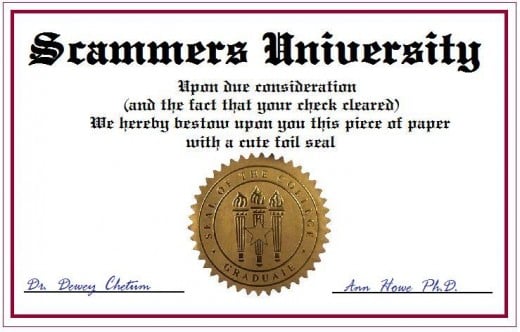How to Recognize Online Degree Scams
According to the U.S Department of Education, forty percent of college students are now over the age of 24. As a result, online education has become a booming industry, one which has a huge appear for students who have to juggle the needs of their jobs and families in addition to schoolwork.
The downside of this increase in the availability of online colleges is an increase in distance learning scams, sometimes referred to as diploma mills or degree mills. These "schools" are scams which charge real money for a degree that will not be accepted by most employers or institutions. This can mean real trouble once the check is cashed and applications for jobs and further studies are rapidly declined.

Red Flags
A common red flag for these schools are deals that seems "too good to be true." For example, a diploma or certification that can be earned in half the normal time, or significant credit (more than the equivalent of just a few courses) given for life experience, can be a good tip off.
However, these schools aren't always so easy to spot. Many use misleading names and logos, similar to existing colleges and universities, but are actually little more than one person with a fancy website and stack of diplomas printed off a home computer.
Check Accredation
One of the easiest ways to identify whether or not a college is a scam or a real opportunity is to check their accredation status. Colleges and universities should be recognized by an approved state, regional or national accrediting agency. This information is usually prominently displayed on their website.
Watch out though, some schools will claim accreditation from an unrecognized or made-up agency. The best (and easiest) way to verify the accreditation of a school is to go to the U.S. Department of Education website, and put in a keyword search for the school.
Do Your Homework
When thinking about applying to any online school, a little bit of homework goes a long way. Before handing over any money, which is often required for the application, students should consider the following criteria:
• Length of time: Does the school promise a degree in half the time of other similar programs? If so, this may be a sign its not a real deal.
• Better Business Bureau: Are there complaints against the institution/company?
• Certification: Does the school offer a state or trade recognized certification or license, or assistance in registering for any necessary exams?
• Relevance: Is the certification offered the one that employers will require, or will they ask for further training? Check out local job listings in your area to find out.
• Recognition: Is the school locally recognized for its graduates? Call local businesses and ask if they are familiar with it. If a local offers a similar program, call or email that department of the college and ask for information. Most programs will be aware of their competition.
• Recommendation: Don't rely on any website affiliated with the school to vouch for its authenticity. Similarly, testimonials also have the potential to be misleading. It is easy to pay a nominal fee to someone to say great things about a program, no matter what their experience, or if they were even a student.









